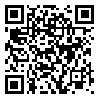Volume 5, Issue 2 (2019)
IEM 2019, 5(2): 33-40 |
Back to browse issues page
Download citation:
BibTeX | RIS | EndNote | Medlars | ProCite | Reference Manager | RefWorks
Send citation to:



BibTeX | RIS | EndNote | Medlars | ProCite | Reference Manager | RefWorks
Send citation to:
mahmoudnia F. Antibacterial Effect of Thymus kotschyanus Boiss Leaves Extract on Some Gram-Negative Bacteria . IEM 2019; 5 (2) :33-40
URL: http://iem.modares.ac.ir/article-4-34159-en.html
URL: http://iem.modares.ac.ir/article-4-34159-en.html
Department of Biology, Faculty of Science, Farhangian University. , f.mahmoudnia@cfu.ac.ir
Abstract: (3398 Views)
Aims: The use of medications with plant origin covers a wide variety of maladies and constitutes an alternative way to antibiotic therapy, which seems to be no longer promising due to the widespread antibiotics resistance among the pathogenic microorganisms.
Active principles having antimicrobial activity could be extracted and purified from plants and used in developing new medications. Among several diseases which have historically scourged man, some of the gram-negative bacteria are potentially epidemic and considered as one of the most outstanding causes of diarrhea. Therefore, this study aimed to evaluate the antibacterial activity of Thymus kotschyanus extracts.
Materials & Methods: The antimicrobial effect of T. kotschyanus Boiss leaves extract on some gram-negative bacteria strains was assayed in vitro by the disk diffusion technique. Dried and crushed plant materials were extracted from distilled water by evaporation and distillation. Finally, the antimicrobial assays were carried out for the plant, and the results were compared with an ampicillin disk results.
Findings: Escherichia coli, Pseudomonas aeruginosa, Klebsiella pneumoniae, Salmonella typhimurium, Entrobacter cloacae, Proteus mirabilis, and Shigella dysenteriae were apparently killed by the extract, as judged by the presence of growth inhibition halos in the assays.
The results of minimum inhibitory concentrations (MICs) showed that E. coli and E. cloacae strains were better inhibited by the extract.
Conclusion: The above results were similar to those from ampicillin disk, suggesting that T. kotschyanus Boiss could be used as a source of active principles against some gram-negative bacteria. Therefore, the tested Thymus extract could be considered as a valuable natural antibacterial source, which seems to be applicable in both medicine and food industry.
Active principles having antimicrobial activity could be extracted and purified from plants and used in developing new medications. Among several diseases which have historically scourged man, some of the gram-negative bacteria are potentially epidemic and considered as one of the most outstanding causes of diarrhea. Therefore, this study aimed to evaluate the antibacterial activity of Thymus kotschyanus extracts.
Materials & Methods: The antimicrobial effect of T. kotschyanus Boiss leaves extract on some gram-negative bacteria strains was assayed in vitro by the disk diffusion technique. Dried and crushed plant materials were extracted from distilled water by evaporation and distillation. Finally, the antimicrobial assays were carried out for the plant, and the results were compared with an ampicillin disk results.
Findings: Escherichia coli, Pseudomonas aeruginosa, Klebsiella pneumoniae, Salmonella typhimurium, Entrobacter cloacae, Proteus mirabilis, and Shigella dysenteriae were apparently killed by the extract, as judged by the presence of growth inhibition halos in the assays.
The results of minimum inhibitory concentrations (MICs) showed that E. coli and E. cloacae strains were better inhibited by the extract.
Conclusion: The above results were similar to those from ampicillin disk, suggesting that T. kotschyanus Boiss could be used as a source of active principles against some gram-negative bacteria. Therefore, the tested Thymus extract could be considered as a valuable natural antibacterial source, which seems to be applicable in both medicine and food industry.
Article Type: Original Research |
Subject:
Bacteriology
Received: 2019/06/24 | Accepted: 2019/08/2 | Published: 2019/09/8
Received: 2019/06/24 | Accepted: 2019/08/2 | Published: 2019/09/8
Send email to the article author
| Rights and permissions | |
 |
This work is licensed under a Creative Commons Attribution-NonCommercial 4.0 International License. |








